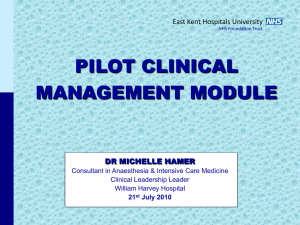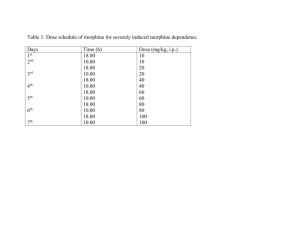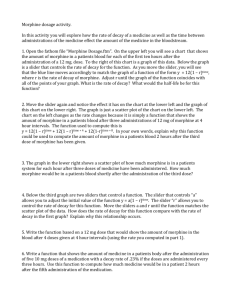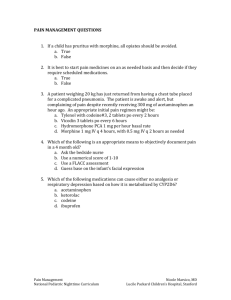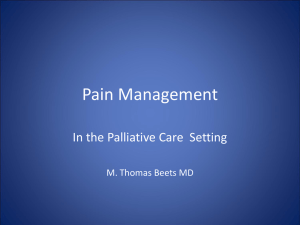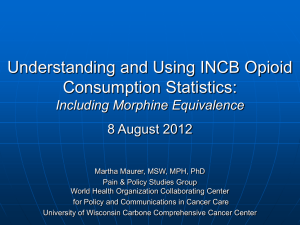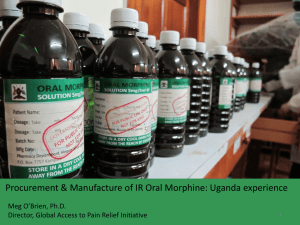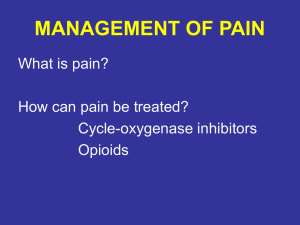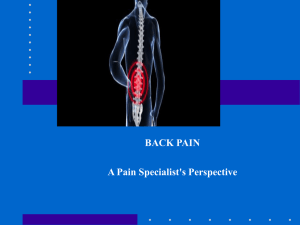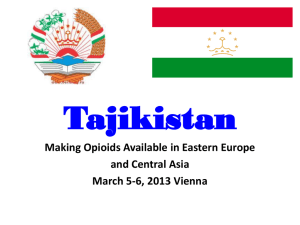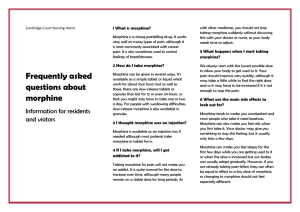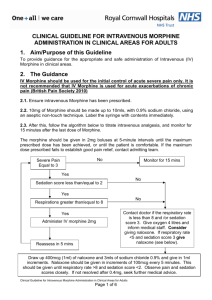Anaesthesia for JMOs
advertisement
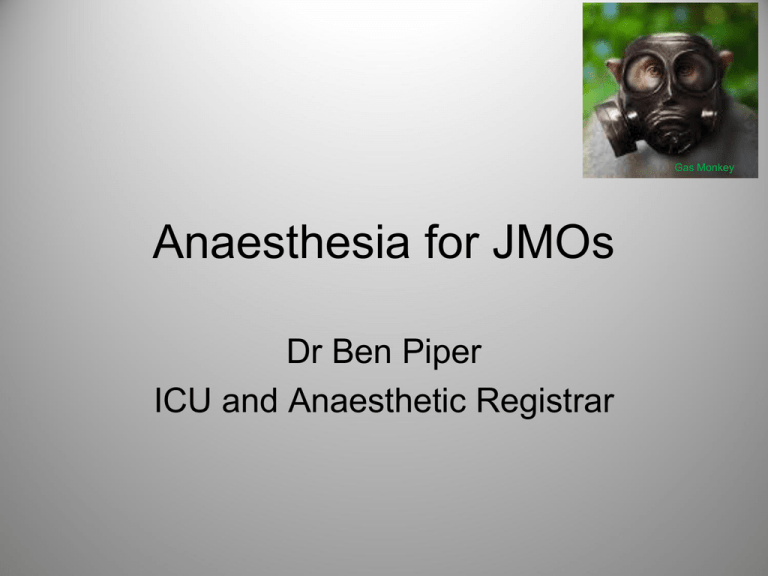
Gas Monkey Anaesthesia for JMOs Dr Ben Piper ICU and Anaesthetic Registrar What we will cover today 1. Acute Pain on the wards• Some “go-to” moves. 2. Special circumstances• Problems after Spinal and Epidural anaesthesia If we have time… 1. My patient needs surgery• What does the anesthetist want to know? Pain • What is pain? – An unpleasant sensory and emotional experience associated with actual or perceived tissue damage. • Types of Pain- “the good, the bad and the ugly” – – – – Somatic- good Visceral- bad Neuropathic Psychogenic (careful now) Ugly Multi Modal Analgesia Case Study • 46yo 140kg lady 12hrs post ORIF of patella • 10/10 pain in anterior knee • Screaming, sweaty, tachycardic – Currently on Paracetamol 1g QID, Endone 5-10mg Q4H, • What sort of pain is this? • Why now? • What can you do? What do you do? Options…. What would you do? 1. 2. 3. 4. 5. 6. Endone: give double stat dose (20mg) NSAIDs STAT and chart regular dose Oxycontin 20mg BD IM Morphine 0.1mg/kg Lean body mass!!!!! IV Morphine 0.05mg/kg Say: “What did you expect, this is surgery- harden up princess”. 7. Page the Anaesthetic Registrar Pain is like fire…… Get it before it gets you…… Case Study cont… • Your plan: – Damage control- “put out the fire” • • • • IV morphine 5mg STAT IV morphine 2mg increments every 10min Patient will need supplemental Oxygen Regular obs- Q15min for 1hr post IV morphine – Planning ahead • Chart regular ibuprofen 400mg TDS • Increase Endone frequency to 10mg Q3H • If not controlled call APS for help Case Study cont… • Your excellent plan worked…1hr later – Pain is now 1/10 – RR 7 – Sat 92% on 3L • What is going on? What will/can you do? Case Study cont… • O/E: pupils 2mm R=L, drowsy. – You increase Oxygen to 100% NRBM – Sats now 94% • What is the problem? • How long does morphine “last” • You decide on Naloxone – What about the pain? – How much? – How often? Morphine and Naloxone Much longer than most think! • Morphine Endone peak 30min duration 1-2 hrs – IV Peak 10-20min Duration 1-2hrs – IM Peak 30min Duration 2-3hrs • Naloxone – IV Dose 100mcg at a time wait 1min- repeat. – (slow and steady, you can always give more!!) – Duration 30-60min HENCE need to remain monitored and may need repeat dosing (it wears off before morphine!) – What are you aiming for? – Here is an ampoule- draw it up as you would use it! Fixed • After two doses of 100mcg the patient is less drowsy, RR 14, sat 98% • You keep her on Oxygen with 15min Obs for the next hour, 30min the hour after that. • Pain is settling and she gets a good nights sleep! She thinks you are a hero! Take home message • • • All doctors need to have a plan for the patient with severe pain! All patients on IV/IM opiates need Oxygen! Get to know your core drugs- discuss a plan with a senior and try it in daylight hours! – • (alone at night is not the time!) Know how to get: 1. Help when you are unsure 2. Yourself and the patient out of trouble! – Have a few “go to moves” Special Circumstances “Stuff that fancy pants Anaesthetic doctors do but don’t tell anyone about” – Anonymous JMO Case study: “No sympathy” • 64yo man returned to ward post TURP – Bkg: HTN, smoker, BPH • Nurse calls for clinical review: – Obs: BP 90/40 HR 60 – O/E: pain free, talking to you • What do you do? Choose your own adventure 1. 2. 3. 4. Bolus IVF 500mL Don’t worry his HR is not elevated (60) Withhold tonight's perindopril dose Panic Case study: “No sympathy” • You bolus 500mL and with hold his perindopril • 15min later: – BP75/40, HR 52, nauseated – What do you do? What is going on? – Why is this man not maintaining his BP? Memory scratcher Sensor Response Case study: “Overly sympathetic” • You check his sensation: • “He is numb to the nipples” • “High Block”: – – – – This is a medical emergency Stop any intrathecal medications Call a MET Give IVF, elevate legs, ACLS • Treatment: Hopefully the cavalry will arrive! • IVF- Starling may help a bit! • Vasopressor + chronotropy: Alpha and beta agonist! – Don’t do this unless you know what you are doing!! – Get advise from someone who knows! – This is a registrar “go to move” Case Study: “Morphology” • 56yo man, 4hrs post TKR – PMHx: OA, OSA – Nurses ask for review b/c RR 6 sat 98% • Initial thoughts? • What do you need to know? Case Study: “Morphology” • On Exam: – Drowsy but can answer questions, Pupils 3mm reactive. – Pain free – No opiates have been given post operatively. – Block height to umbilicus starting to wear off. Case Study: “Morphology” • RR now 5 • Sat 92%- bugger. • 100% NRBM/MET call • The anaesthetic registrar gives naloxne in 100mcg increments- plan basically the same as before! • Why?? Case Study: “Morphology” • As it turns our morphine and Fentanyl in commonly used in spinal anaesthetics. – Here are some charts: these are the areas to look at on the anaesthetic chart for this info. • Was it the Morphine or the Fentanyl? Why the delay?? Any ideas? Take home message • Neuro-Axial blockade can cause major disruption in cardiovascular/Resp function- it can be delayed and present on the ward. – It must be recognised!! • Management of Post Op patients needs an understanding of basic physiological principles that many of us forget after med school! • Read the Anaesthetic sheet! Its full of goodies! • If in doubt ask!! We don’t bite!! Quick: other pearls for the ward.. • Beta Blockers: It is quiet rare that you need to withhold these (bradycardia, heart block) – generally don’t do it, even if NBM!! • Oxycontin: Do not withhold chronic opiates preoperatively even if NBM! Special patients: • The classic “possible opiate seeker”, give the patient the benefit of the doubt initially- seek higher level input thereafter. Tramadol can be handy here- less “buz” but good analgesic. • Palliative care: seek higher advise early!! They are lovely people to deal with! • Any questions??? My MET call mantra- “ABC and…” • • Have a basic plan for the nurses: Identify the nurse looking after the patient, “Jane”: “Jane, can you please: 1. Increase the oxygen to 100%” “Jane, can you please get someone else to: 1. Check a BSL 2. Do an ECG 3. Get me the notes So that you can tell me about what has happened”. “Thankyou Jane-” • This: – – – Gives the impression that you are not panicking, gives others confidence in you and themselves, and gets things done Thanks “Have fun at work: – do Anaesthetics and/or Intensive Care” My patient needs Surgery… My patient needs Surgery… • What does the anaesthetic team need to know? (A part from the basic PMHx and current problem) • We want to know what degree of stress/trauma a person can withstand? – The surgeons are about to unleash their fury on them. Key Question: • What is their physiological reserve? A basic approach (there are many) • Airway & Anaesthetic History: • Breathing: Respiratory function/reserve • Circualtion: Cardiovascular function/reserve • Drugs: what, why and when? • Eating: When, what Airway & Anaesthetic History: • Airway: – Can their mouth open? – Can their neck move? – Can you see their oropharynx? MP score – Are they obese? • Have they had previous anaesthetics? – Were there any problems? Breathing: Respiratory function/reserve • Respiratory – Smoker? – SOB: when, why – WOB due to either • Restriction from parenchyma (fibrosis/APO) • Obstruction to flow (asthma/COPD) – Spirometry -if available• FEV1 • FVC – Concurrent infection Circualtion: Cardiovascular function/reserve Cardiovascular: (more than just “patient has history of IHD”!! We all say it, but it means nothing!!) – Exercise tolerance- the best test • Walking distance/stairs/what actually stops them – Cardiac Failure: what type, symptomatic? – Angina: when, why, new? – Valve disease: Murmur, symptomatic? – Stents of surgery: what, when Drugs: what, when and why? • Special attention to: – Cardiac meds – Antiplatelets – Anticoagulants – This will effect the type of anaesthesia that can be utilized. • E.g. Spinal vs General
